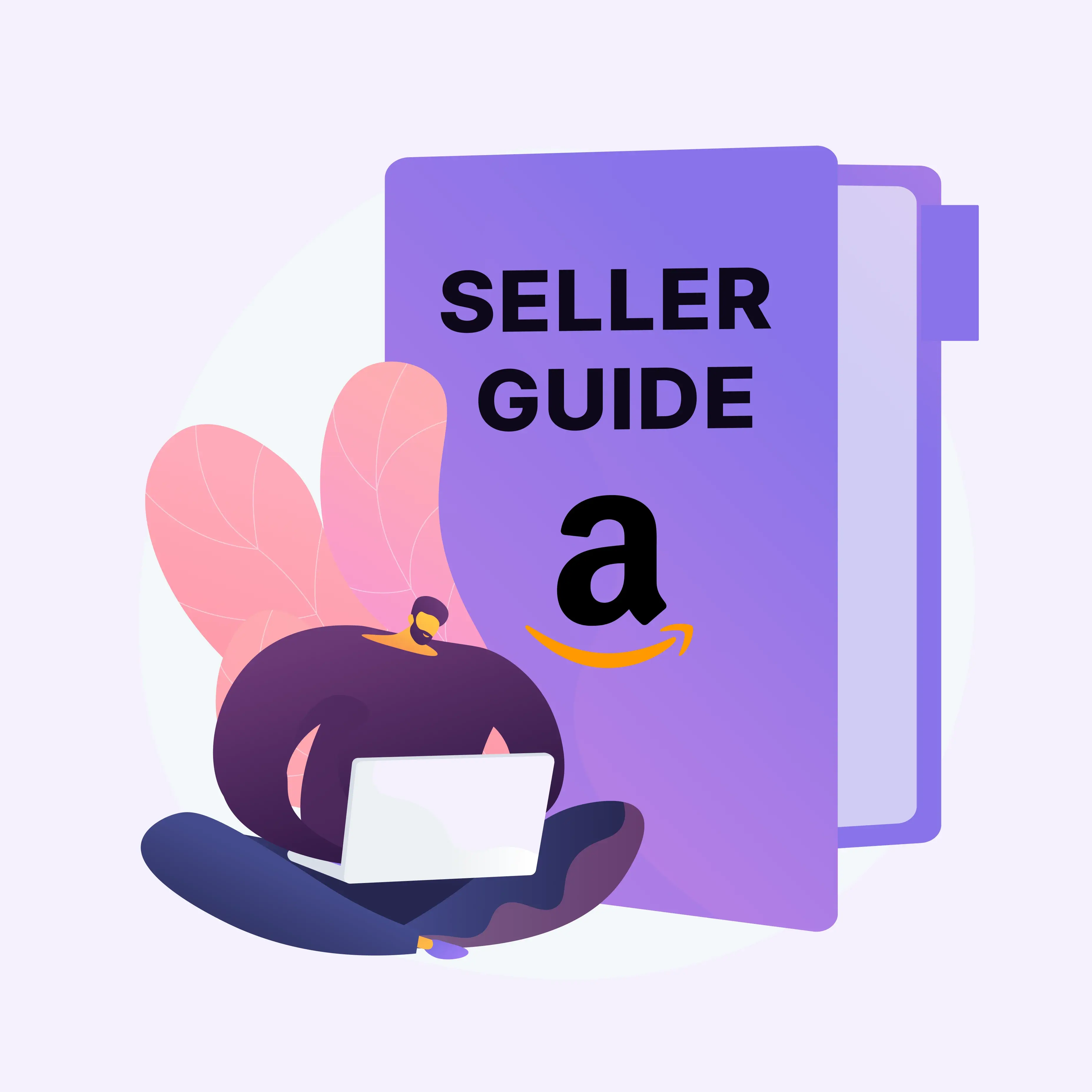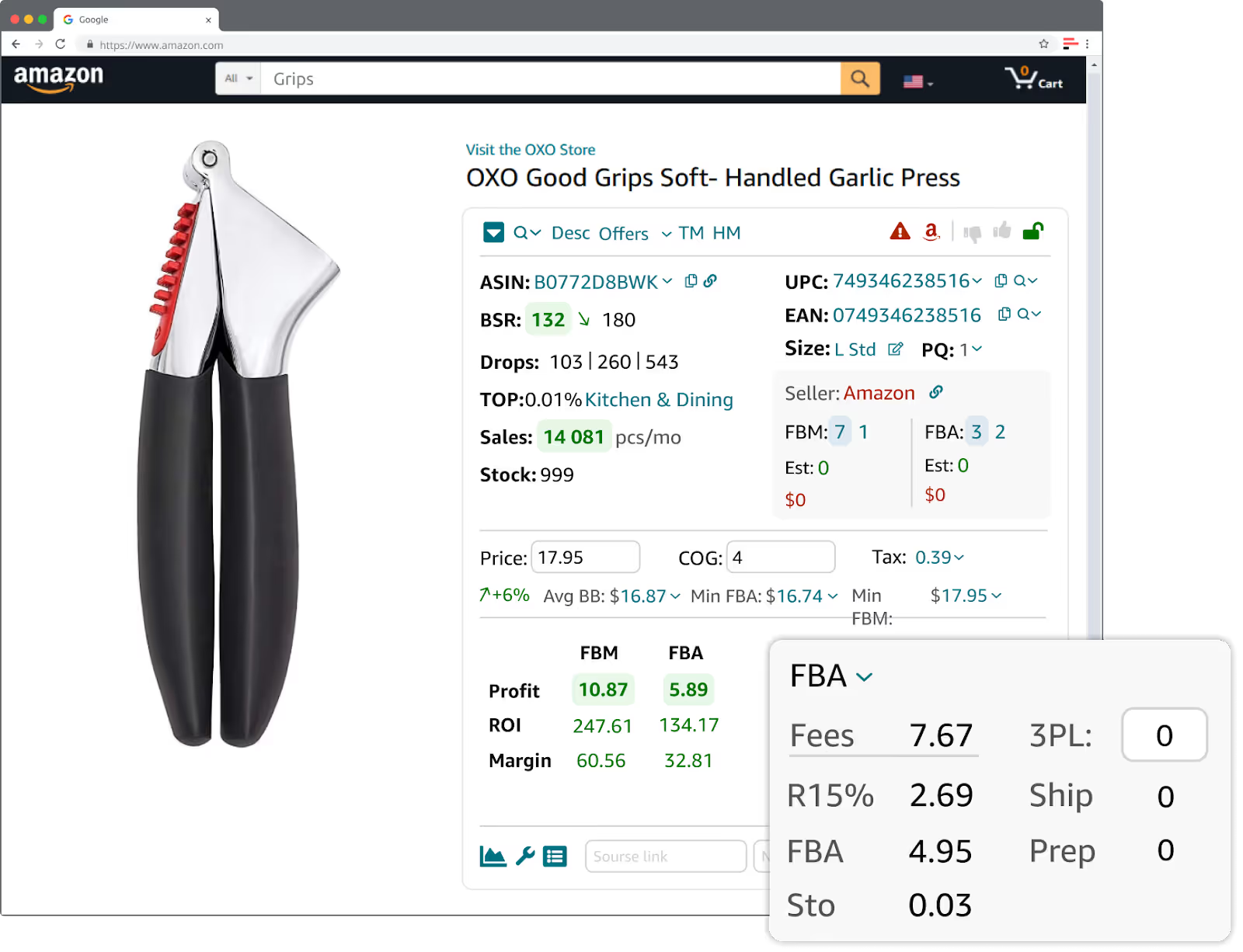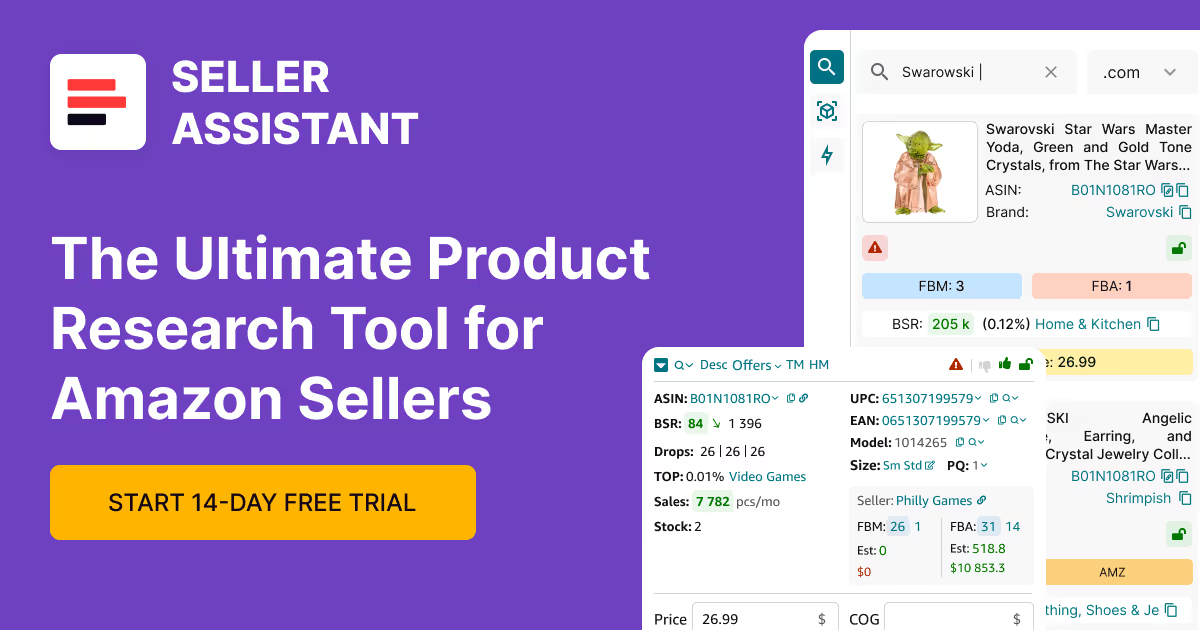Amazon 3PL - Complete Guide for Sellers
Download Amazon Seller Guide
This guide will help you get started, understand the basics of Amazon selling, and explain in simple words how it all works.

Managing inventory, warehousing, and fulfillment is time-consuming and challenging, especially as your Amazon business grows. One day you can run into a situation when you receive more orders than you can process yourself. At that point, you start to feel that your time and effort are available in a limited amount.
If that is your case, one solution is to outsource some of these tasks to a third-party logistics provider (3PL). In this post, we will define what 3PL is, what services they offer, their benefits, and how to select the right 3PL provider.
What Is a 3PL?
A third-party logistics provider (3PL) offers businesses a range of logistics services. These services include inventory management, shipping, storage, and return and exchange management. Essentially, a 3PL takes care of your logistics needs, allowing you to focus on other aspects of your business.
What Services Do 3PLs Offer?
Warehousing
An Amazon 3PL can provide warehousing facilities to store your inventory. These facilities can range from basic storage to advanced facilities with specialized features such as temperature control, security, and compliance with regulatory requirements. If you plan to sell products requiring specific storage and processing conditions, like dangerous goods, used books, etc., you must ensure the warehouse offers such services.
Inventory Management
A 3PL company can help manage your inventory by monitoring stock levels, handling stock movements, and updating your inventory records. That can help you avoid stockouts, reduce excess inventory, and optimize your stock levels.
Expedited Shipping
A 3PL can help you ship your products quickly and efficiently. That can include expedited shipping options, such as same-day or next-day delivery, as well as tracking and delivery confirmation services.
Fulfillment Operations
A 3PL can handle your entire fulfillment process, including picking, packing, and shipping your products. That can help you save time and money by outsourcing these operations to an experienced provider. If your inventory requires specific packaging, like fragile goods, they will ensure to pack and handle it with additional care. In many cases, for instance, if you sell oversize products, using 3PL services is more cost-effective compared to Amazon fulfillment services.
Returns Processing
A 3PL can help you manage customer returns by handling the entire process, including processing returns, restocking returned items, and issuing refunds or exchanges.
Related: Amazon FBA Fees 2023
FBA vs FBM: Which is Better for Amazon Sellers in 2023?
What Are The Benefits Of 3PL?
Using a 3PL can offer a range of benefits to Amazon sellers. Some of the key advantages you can find below.
Cost saving
Using a 3PL can help you save money on logistics operations by outsourcing these functions to a provider with economies of scale. A 3PL can help avoid investing in costly warehousing facilities, equipment, and staff. In addition, 3PL companies are usually able to offer cost-efficient shipping rates of their own fleet or due to the pre-agreed discounted pricing, they get from major industry carriers.
Optimized end-to-end logistics
End-to-end logistics services offered by most 3PLs include everything you need to process and deliver your orders. You can simply list a product on Amazon and order it from the supplier, and 3PL will do the rest. The 3PL company acts as one-stop-shop taking care of your inventory. That allows you to streamline logistics processes and improve overall supply chain efficiency.
Advanced high-tech solutions
Most 3PLs offer advanced technology solutions, such as warehouse management systems, inventory tracking software, and automated order fulfillment processes. These solutions can help you ensure real-time visibility and control of your inventory, reduce errors, and improve customer satisfaction.
Flexible personalized approach
A 3PL can provide a personalized approach to logistics tailored to your specific needs. That can include customized packaging, labeling, and shipping options to meet your particular requirements. In addition, 3PLs offer flexible pricing conditions, and you can often negotiate favorable prices based on your business needs.
How Does a 3PL Work?
When you partner with a 3PL, you typically provide them with your inventory information and order necessary data. The 3PL will then manage your inventory by picking, packing, and shipping your products on your behalf. They will also handle returns and provide regular reports on your inventory levels, order fulfillment rates, and other logistics metrics.
3PLs offer a different range of services and fulfillment solutions, depending on your needs; therefore, there’s no one-size-fits-all process they will apply for your logistics. Below is one example of what a typical Amazon 3PL service may look like.
When you decide that it’s time to sell specific inventory, you must send it to your 3PL provider from your storage space or directly from the supplier. The 3PL receives and processes each unit according to its internal warehouse procedure. When a buyer orders a product from you, you can either manually submit the order to your 3PL or, most commonly, they receive it automatically in the software. Once received, a 3PL fulfillment center’s worker picks the order, adds a receipt, and properly packs and labels it. After that, 3PL sends the order to a local shipping company (e.g., DHL, FedEx, USPS) that delivers it to the customer’s address.
Does Your Business Need a 3PL?
Now that we’ve covered what Amazon 3rd party logistics is and what services they offer, you may wonder whether your business needs a 3PL. Below are some signs that it may be time to consider partnering with a 3PL.
Your business becomes big
If you are overwhelmed with orders, not only a couple of times a year during the holiday season or on Amazon Prime Day when the sales peak, but you consistently sell more inventory than you can store or fulfill — it may be time to think about outsourcing logistics to maintain the pace. 3PL will help you avoid running out of storage space or struggling to keep up with your order volume. They will provide warehouse services and fulfillment capacity to help you scale your business.
Your focus is growth
Selling on Amazon includes many tasks, all requiring time and effort. If you want to focus on scaling your business and profits, consider delegating some of the more routine (however essential) operations, like inventory management, order processing, and fulfillment, to 3PL. By outsourcing your logistics operations, you can free up your time and resources to focus on growing your business in other areas, such as product research if you are an online arbitrage seller, negotiating with brands or suppliers if you’re engaged in wholesale, customer service, and more.
Cost-effective solution
Storing and processing inventory yourself becomes too expensive or problematic as your business scales. If that is the case, partnering with a 3PL can be a cost-effective solution for businesses with the resources to delegate their logistics operations to a third party. However, it’s essential to carefully consider the costs of working with a 3PL, including their fees, shipping costs, and additional expenses. Seller Assistant App can show you 3PL cost for each product.

Conquering new markets
If you want to expand to new locations, you must select a 3PL with a suitable network. For example, if you sell locally, having a fulfillment center close to your location may save you money. If you plan to sell internationally, selecting a 3PL close to the transportation hub may be a good idea. That may be the best option if your 3PL provider has fulfillment centers in multiple locations. If you want to expand your business to multiple new marketplaces, partnering with a 3PL with a global network can help you quickly and easily establish a presence in new markets.
Related: 13 Rules of OA Product Research Tested by Pain and Gain of Amazon Seller
Amazon Wholesale: All You Need To Know In 2023
How To Select the Right 3PL Provider?
If you’ve decided that a 3PL is right for your business, the next step is to choose the right provider. Here we will discuss some factors to consider when selecting a 3PL.
Range of services
Though 3PLs offer similar types of basic services, their additional capabilities, scalability, and service portfolio may differ significantly. For instance, not all 3PLs may handle returns, can process dangerous goods, or accept small numbers of online or retail arbitrage products. Also, it’s better to select an Amazon third-party logistics provider offering inspection services (that reduces bad customer feedback and returns). Make sure 3PL provides the specific services you need.
Delivery terms and efficiency
Amazon customers expect you to deliver fast; therefore, the product processing time is crucial. On average, the preparation time for Amazon FBA products must be 24 – 48 hours. Ensure the company offers the shipping speed options (e.g., one- or two-day delivery) you require. Look into their capability to handle increased or decreased product volumes (in case of rapid demand changes). Also, consider the company’s delivery reliability.
Suitable fulfillment network
Check if the 3PL has fulfillment facilities located in the regions where you need to ship your products. If you sell online arbitrage products, sales tax may apply. Using a 3PL with a fulfillment center in a sales tax-free state (Montana, Delaware, Oregon, or New Hampshire) can save you money. If you often source products from overseas, you can look for a company located close to a port.
Pricing
Compare the pricing of different 3PL providers and ensure you understand all the costs involved, including fees, shipping, and additional expenses. 3PLs may offer different pricing models, including per-item fees or fixed monthly payments. As a rule, the price depends on the volume of your inventory and the size of the products. The smaller and lighter the products are, the lower the per-unit price is.
Technology
Consider 3PL’s technology capabilities, such as warehouse management system, inventory tracking software, and order fulfillment automation. Select a provider with reliable tracking software to monitor your products at every stage of the fulfillment process.
Track record
Check 3PL’s reputation in the industry, including its track record of customer satisfaction, service quality, and reliability. Look at the references and reviews about the company from other customers.
Final Thoughts
Partnering with a 3PL can significantly improve logistics operations, reduce costs, and scale your business. By understanding what a 3PL is, what services they offer, and their benefits, you can make an informed decision about whether a 3PL is right for your business.
At the same time, you must remember that 3PL services come with a cost. It’s essential to carefully consider the costs of working with a 3PL to reach your profitability targets. Seller Assistant App shows you 3PL cost for each product. It is an all-in-one extension incorporating features vital for product research. It combines an FBM&FBA profit calculator, Quick View, Stock Checker, and Restrictions Checker in one tool.

.svg)













